Comprehensive Cybersecurity Report: Threats, Challenges, and Solutions
VerifiedAdded on 2021/05/31
|6
|1326
|55
Report
AI Summary
This report provides an overview of cybersecurity, defining it as the protection of computer systems and data from theft, damage, and unauthorized access. It highlights the increasing prevalence of cybercrimes facilitated by the internet and interconnected devices. The report identifies key threats such as unauthorized access, data theft, and hacking, emphasizing the challenges organizations face in maintaining data security, including malware, user vulnerabilities, budget constraints, and the evolving nature of cyberattacks. Mitigation strategies discussed include patching applications, application whitelisting, restricting administrative privileges, input validation, and the importance of firewalls. The conclusion underscores the critical need for robust cybersecurity measures to protect sensitive information.
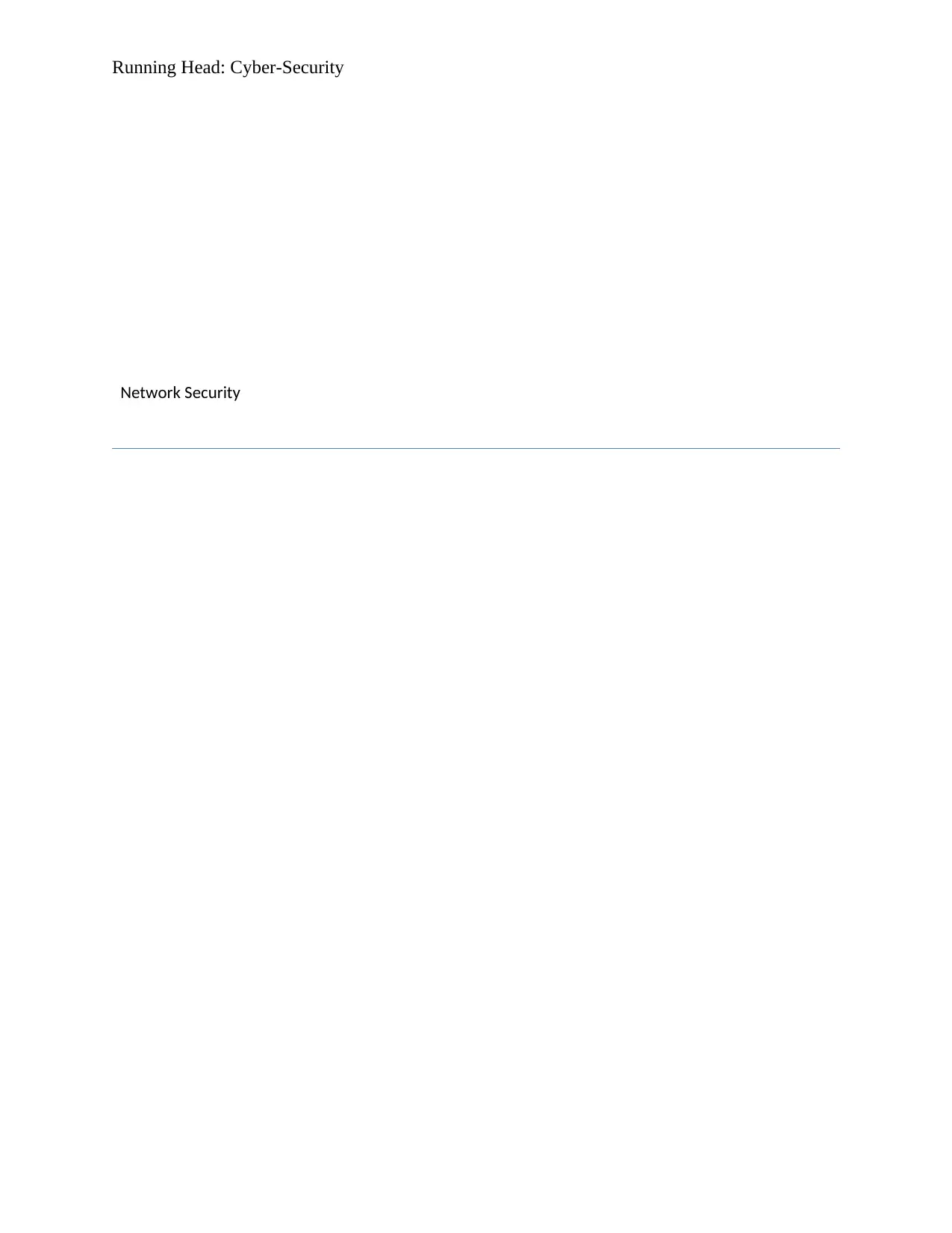
Running Head: Cyber-Security
Network Security
Network Security
Paraphrase This Document
Need a fresh take? Get an instant paraphrase of this document with our AI Paraphraser
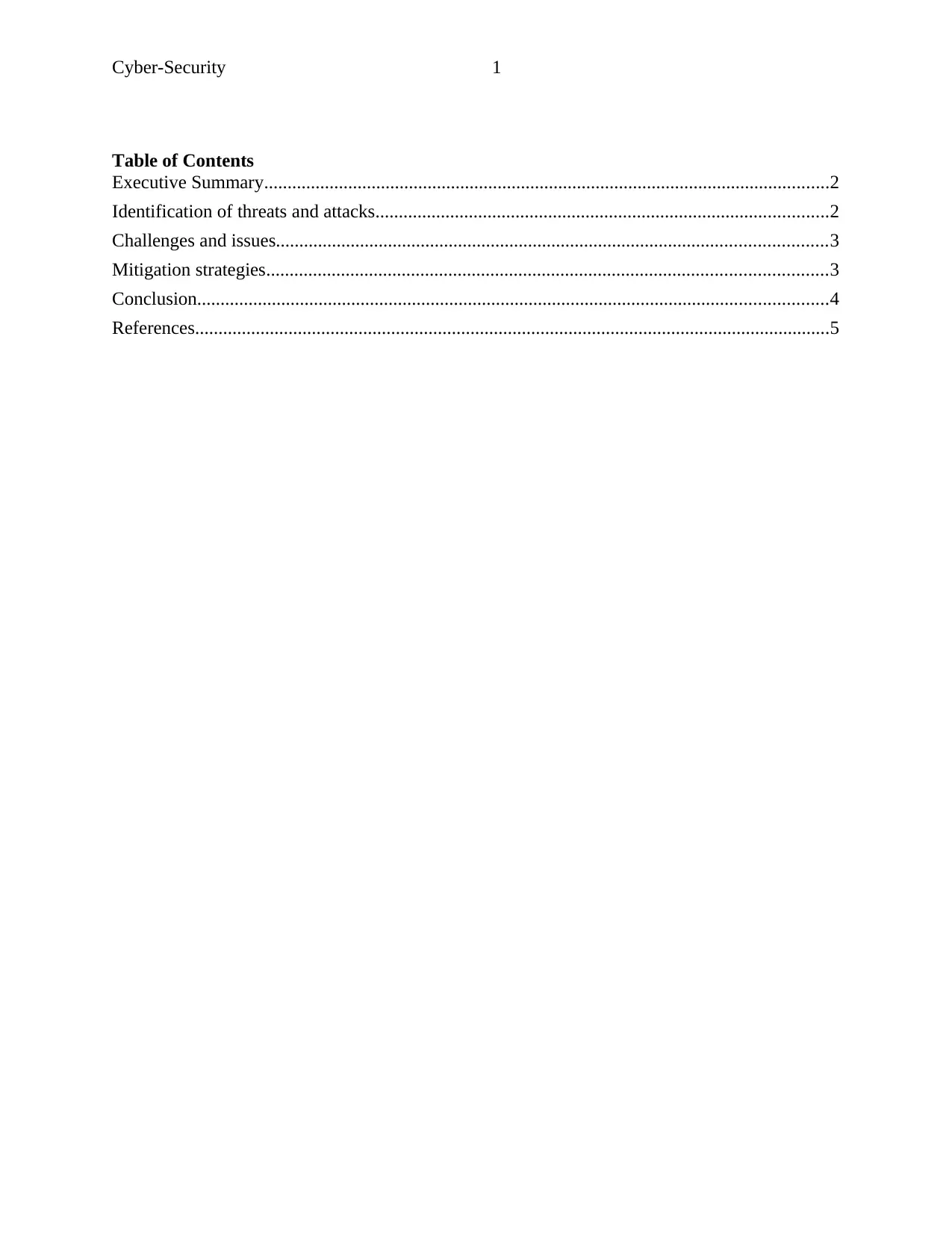
Cyber-Security 1
Table of Contents
Executive Summary.........................................................................................................................2
Identification of threats and attacks.................................................................................................2
Challenges and issues......................................................................................................................3
Mitigation strategies........................................................................................................................3
Conclusion.......................................................................................................................................4
References........................................................................................................................................5
Table of Contents
Executive Summary.........................................................................................................................2
Identification of threats and attacks.................................................................................................2
Challenges and issues......................................................................................................................3
Mitigation strategies........................................................................................................................3
Conclusion.......................................................................................................................................4
References........................................................................................................................................5
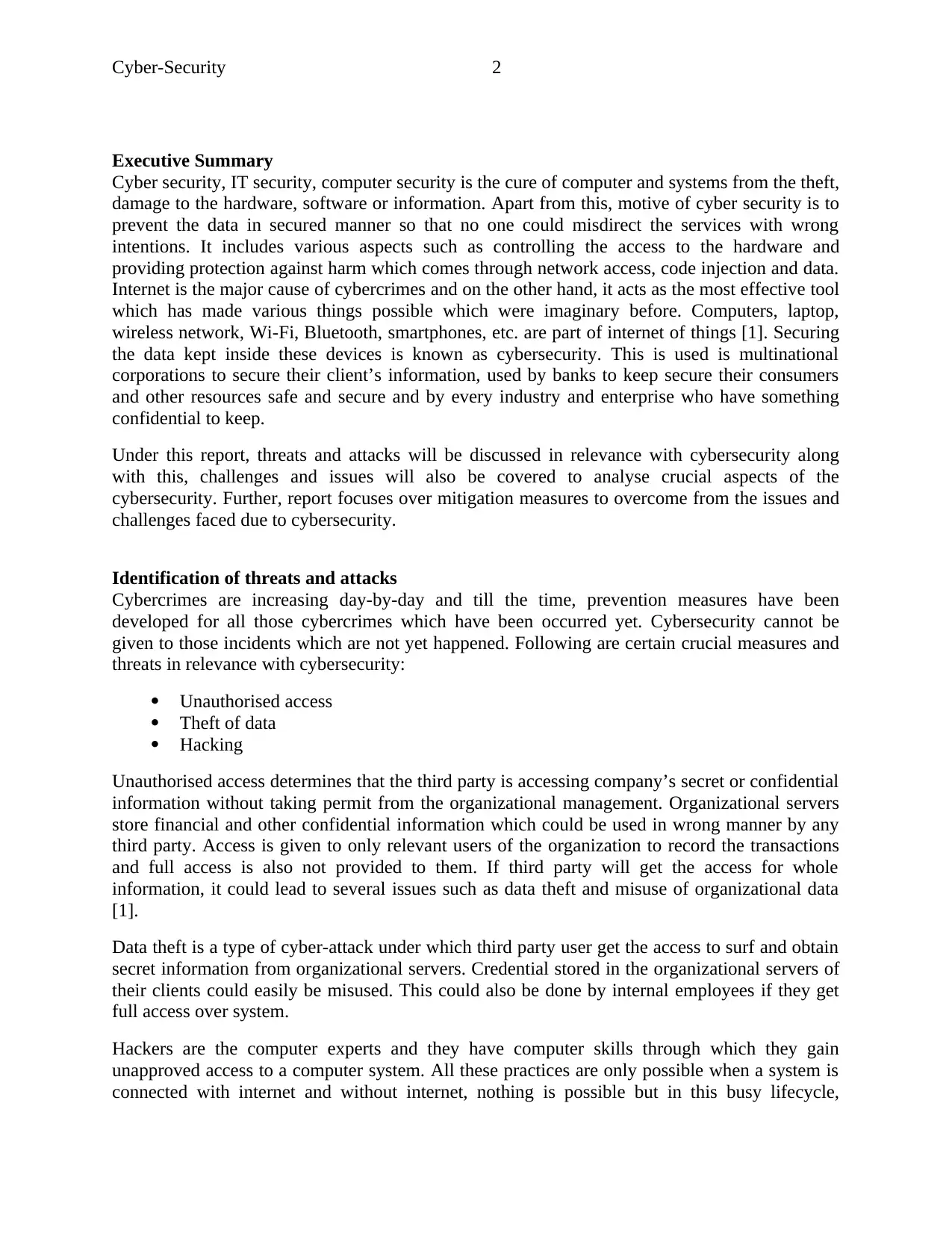
Cyber-Security 2
Executive Summary
Cyber security, IT security, computer security is the cure of computer and systems from the theft,
damage to the hardware, software or information. Apart from this, motive of cyber security is to
prevent the data in secured manner so that no one could misdirect the services with wrong
intentions. It includes various aspects such as controlling the access to the hardware and
providing protection against harm which comes through network access, code injection and data.
Internet is the major cause of cybercrimes and on the other hand, it acts as the most effective tool
which has made various things possible which were imaginary before. Computers, laptop,
wireless network, Wi-Fi, Bluetooth, smartphones, etc. are part of internet of things [1]. Securing
the data kept inside these devices is known as cybersecurity. This is used is multinational
corporations to secure their client’s information, used by banks to keep secure their consumers
and other resources safe and secure and by every industry and enterprise who have something
confidential to keep.
Under this report, threats and attacks will be discussed in relevance with cybersecurity along
with this, challenges and issues will also be covered to analyse crucial aspects of the
cybersecurity. Further, report focuses over mitigation measures to overcome from the issues and
challenges faced due to cybersecurity.
Identification of threats and attacks
Cybercrimes are increasing day-by-day and till the time, prevention measures have been
developed for all those cybercrimes which have been occurred yet. Cybersecurity cannot be
given to those incidents which are not yet happened. Following are certain crucial measures and
threats in relevance with cybersecurity:
Unauthorised access
Theft of data
Hacking
Unauthorised access determines that the third party is accessing company’s secret or confidential
information without taking permit from the organizational management. Organizational servers
store financial and other confidential information which could be used in wrong manner by any
third party. Access is given to only relevant users of the organization to record the transactions
and full access is also not provided to them. If third party will get the access for whole
information, it could lead to several issues such as data theft and misuse of organizational data
[1].
Data theft is a type of cyber-attack under which third party user get the access to surf and obtain
secret information from organizational servers. Credential stored in the organizational servers of
their clients could easily be misused. This could also be done by internal employees if they get
full access over system.
Hackers are the computer experts and they have computer skills through which they gain
unapproved access to a computer system. All these practices are only possible when a system is
connected with internet and without internet, nothing is possible but in this busy lifecycle,
Executive Summary
Cyber security, IT security, computer security is the cure of computer and systems from the theft,
damage to the hardware, software or information. Apart from this, motive of cyber security is to
prevent the data in secured manner so that no one could misdirect the services with wrong
intentions. It includes various aspects such as controlling the access to the hardware and
providing protection against harm which comes through network access, code injection and data.
Internet is the major cause of cybercrimes and on the other hand, it acts as the most effective tool
which has made various things possible which were imaginary before. Computers, laptop,
wireless network, Wi-Fi, Bluetooth, smartphones, etc. are part of internet of things [1]. Securing
the data kept inside these devices is known as cybersecurity. This is used is multinational
corporations to secure their client’s information, used by banks to keep secure their consumers
and other resources safe and secure and by every industry and enterprise who have something
confidential to keep.
Under this report, threats and attacks will be discussed in relevance with cybersecurity along
with this, challenges and issues will also be covered to analyse crucial aspects of the
cybersecurity. Further, report focuses over mitigation measures to overcome from the issues and
challenges faced due to cybersecurity.
Identification of threats and attacks
Cybercrimes are increasing day-by-day and till the time, prevention measures have been
developed for all those cybercrimes which have been occurred yet. Cybersecurity cannot be
given to those incidents which are not yet happened. Following are certain crucial measures and
threats in relevance with cybersecurity:
Unauthorised access
Theft of data
Hacking
Unauthorised access determines that the third party is accessing company’s secret or confidential
information without taking permit from the organizational management. Organizational servers
store financial and other confidential information which could be used in wrong manner by any
third party. Access is given to only relevant users of the organization to record the transactions
and full access is also not provided to them. If third party will get the access for whole
information, it could lead to several issues such as data theft and misuse of organizational data
[1].
Data theft is a type of cyber-attack under which third party user get the access to surf and obtain
secret information from organizational servers. Credential stored in the organizational servers of
their clients could easily be misused. This could also be done by internal employees if they get
full access over system.
Hackers are the computer experts and they have computer skills through which they gain
unapproved access to a computer system. All these practices are only possible when a system is
connected with internet and without internet, nothing is possible but in this busy lifecycle,
⊘ This is a preview!⊘
Do you want full access?
Subscribe today to unlock all pages.

Trusted by 1+ million students worldwide
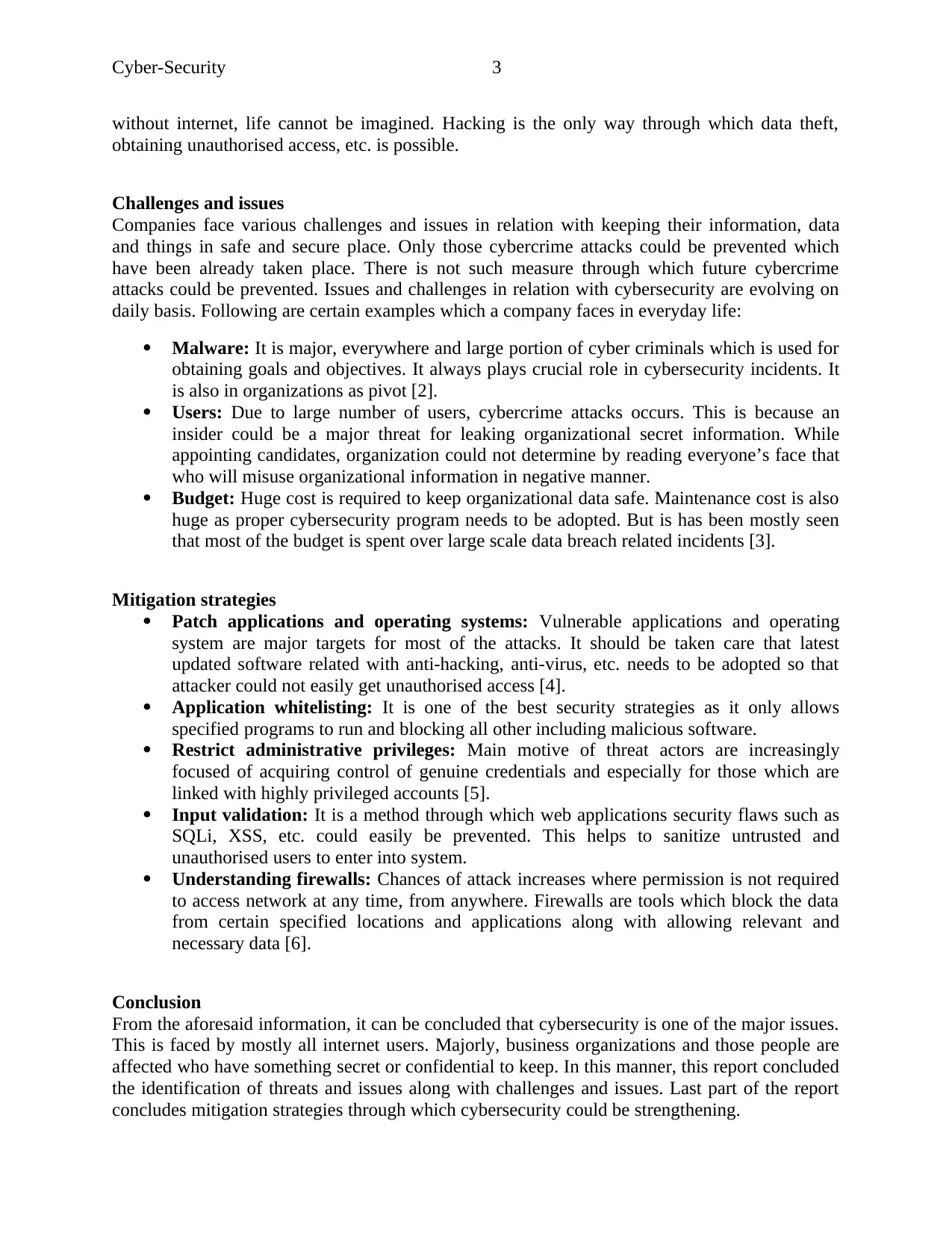
Cyber-Security 3
without internet, life cannot be imagined. Hacking is the only way through which data theft,
obtaining unauthorised access, etc. is possible.
Challenges and issues
Companies face various challenges and issues in relation with keeping their information, data
and things in safe and secure place. Only those cybercrime attacks could be prevented which
have been already taken place. There is not such measure through which future cybercrime
attacks could be prevented. Issues and challenges in relation with cybersecurity are evolving on
daily basis. Following are certain examples which a company faces in everyday life:
Malware: It is major, everywhere and large portion of cyber criminals which is used for
obtaining goals and objectives. It always plays crucial role in cybersecurity incidents. It
is also in organizations as pivot [2].
Users: Due to large number of users, cybercrime attacks occurs. This is because an
insider could be a major threat for leaking organizational secret information. While
appointing candidates, organization could not determine by reading everyone’s face that
who will misuse organizational information in negative manner.
Budget: Huge cost is required to keep organizational data safe. Maintenance cost is also
huge as proper cybersecurity program needs to be adopted. But is has been mostly seen
that most of the budget is spent over large scale data breach related incidents [3].
Mitigation strategies
Patch applications and operating systems: Vulnerable applications and operating
system are major targets for most of the attacks. It should be taken care that latest
updated software related with anti-hacking, anti-virus, etc. needs to be adopted so that
attacker could not easily get unauthorised access [4].
Application whitelisting: It is one of the best security strategies as it only allows
specified programs to run and blocking all other including malicious software.
Restrict administrative privileges: Main motive of threat actors are increasingly
focused of acquiring control of genuine credentials and especially for those which are
linked with highly privileged accounts [5].
Input validation: It is a method through which web applications security flaws such as
SQLi, XSS, etc. could easily be prevented. This helps to sanitize untrusted and
unauthorised users to enter into system.
Understanding firewalls: Chances of attack increases where permission is not required
to access network at any time, from anywhere. Firewalls are tools which block the data
from certain specified locations and applications along with allowing relevant and
necessary data [6].
Conclusion
From the aforesaid information, it can be concluded that cybersecurity is one of the major issues.
This is faced by mostly all internet users. Majorly, business organizations and those people are
affected who have something secret or confidential to keep. In this manner, this report concluded
the identification of threats and issues along with challenges and issues. Last part of the report
concludes mitigation strategies through which cybersecurity could be strengthening.
without internet, life cannot be imagined. Hacking is the only way through which data theft,
obtaining unauthorised access, etc. is possible.
Challenges and issues
Companies face various challenges and issues in relation with keeping their information, data
and things in safe and secure place. Only those cybercrime attacks could be prevented which
have been already taken place. There is not such measure through which future cybercrime
attacks could be prevented. Issues and challenges in relation with cybersecurity are evolving on
daily basis. Following are certain examples which a company faces in everyday life:
Malware: It is major, everywhere and large portion of cyber criminals which is used for
obtaining goals and objectives. It always plays crucial role in cybersecurity incidents. It
is also in organizations as pivot [2].
Users: Due to large number of users, cybercrime attacks occurs. This is because an
insider could be a major threat for leaking organizational secret information. While
appointing candidates, organization could not determine by reading everyone’s face that
who will misuse organizational information in negative manner.
Budget: Huge cost is required to keep organizational data safe. Maintenance cost is also
huge as proper cybersecurity program needs to be adopted. But is has been mostly seen
that most of the budget is spent over large scale data breach related incidents [3].
Mitigation strategies
Patch applications and operating systems: Vulnerable applications and operating
system are major targets for most of the attacks. It should be taken care that latest
updated software related with anti-hacking, anti-virus, etc. needs to be adopted so that
attacker could not easily get unauthorised access [4].
Application whitelisting: It is one of the best security strategies as it only allows
specified programs to run and blocking all other including malicious software.
Restrict administrative privileges: Main motive of threat actors are increasingly
focused of acquiring control of genuine credentials and especially for those which are
linked with highly privileged accounts [5].
Input validation: It is a method through which web applications security flaws such as
SQLi, XSS, etc. could easily be prevented. This helps to sanitize untrusted and
unauthorised users to enter into system.
Understanding firewalls: Chances of attack increases where permission is not required
to access network at any time, from anywhere. Firewalls are tools which block the data
from certain specified locations and applications along with allowing relevant and
necessary data [6].
Conclusion
From the aforesaid information, it can be concluded that cybersecurity is one of the major issues.
This is faced by mostly all internet users. Majorly, business organizations and those people are
affected who have something secret or confidential to keep. In this manner, this report concluded
the identification of threats and issues along with challenges and issues. Last part of the report
concludes mitigation strategies through which cybersecurity could be strengthening.
Paraphrase This Document
Need a fresh take? Get an instant paraphrase of this document with our AI Paraphraser

Cyber-Security 4
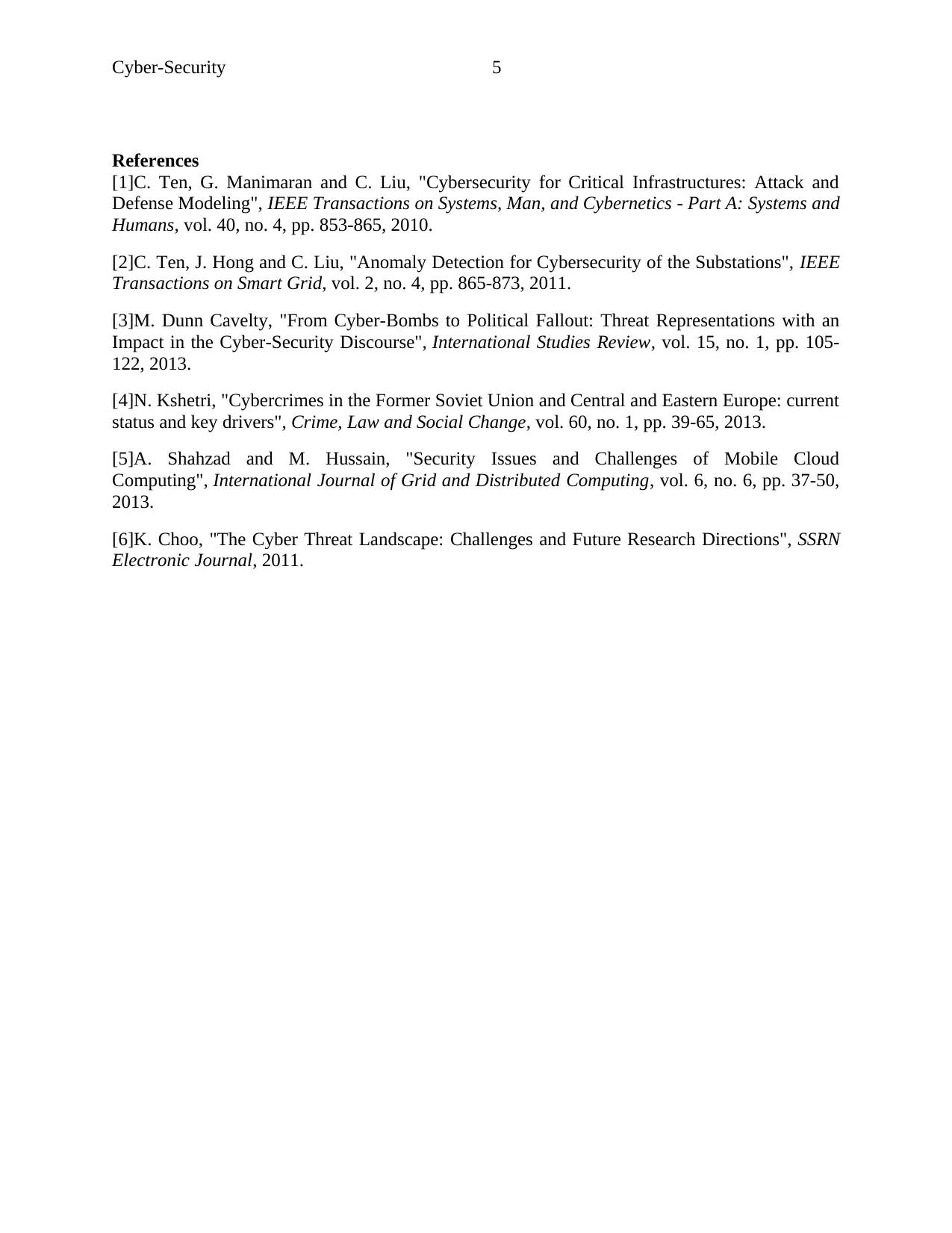
Cyber-Security 5
References
[1]C. Ten, G. Manimaran and C. Liu, "Cybersecurity for Critical Infrastructures: Attack and
Defense Modeling", IEEE Transactions on Systems, Man, and Cybernetics - Part A: Systems and
Humans, vol. 40, no. 4, pp. 853-865, 2010.
[2]C. Ten, J. Hong and C. Liu, "Anomaly Detection for Cybersecurity of the Substations", IEEE
Transactions on Smart Grid, vol. 2, no. 4, pp. 865-873, 2011.
[3]M. Dunn Cavelty, "From Cyber-Bombs to Political Fallout: Threat Representations with an
Impact in the Cyber-Security Discourse", International Studies Review, vol. 15, no. 1, pp. 105-
122, 2013.
[4]N. Kshetri, "Cybercrimes in the Former Soviet Union and Central and Eastern Europe: current
status and key drivers", Crime, Law and Social Change, vol. 60, no. 1, pp. 39-65, 2013.
[5]A. Shahzad and M. Hussain, "Security Issues and Challenges of Mobile Cloud
Computing", International Journal of Grid and Distributed Computing, vol. 6, no. 6, pp. 37-50,
2013.
[6]K. Choo, "The Cyber Threat Landscape: Challenges and Future Research Directions", SSRN
Electronic Journal, 2011.
References
[1]C. Ten, G. Manimaran and C. Liu, "Cybersecurity for Critical Infrastructures: Attack and
Defense Modeling", IEEE Transactions on Systems, Man, and Cybernetics - Part A: Systems and
Humans, vol. 40, no. 4, pp. 853-865, 2010.
[2]C. Ten, J. Hong and C. Liu, "Anomaly Detection for Cybersecurity of the Substations", IEEE
Transactions on Smart Grid, vol. 2, no. 4, pp. 865-873, 2011.
[3]M. Dunn Cavelty, "From Cyber-Bombs to Political Fallout: Threat Representations with an
Impact in the Cyber-Security Discourse", International Studies Review, vol. 15, no. 1, pp. 105-
122, 2013.
[4]N. Kshetri, "Cybercrimes in the Former Soviet Union and Central and Eastern Europe: current
status and key drivers", Crime, Law and Social Change, vol. 60, no. 1, pp. 39-65, 2013.
[5]A. Shahzad and M. Hussain, "Security Issues and Challenges of Mobile Cloud
Computing", International Journal of Grid and Distributed Computing, vol. 6, no. 6, pp. 37-50,
2013.
[6]K. Choo, "The Cyber Threat Landscape: Challenges and Future Research Directions", SSRN
Electronic Journal, 2011.
⊘ This is a preview!⊘
Do you want full access?
Subscribe today to unlock all pages.

Trusted by 1+ million students worldwide
1 out of 6
Related Documents
Your All-in-One AI-Powered Toolkit for Academic Success.
+13062052269
info@desklib.com
Available 24*7 on WhatsApp / Email
![[object Object]](/_next/static/media/star-bottom.7253800d.svg)
Unlock your academic potential
Copyright © 2020–2026 A2Z Services. All Rights Reserved. Developed and managed by ZUCOL.




